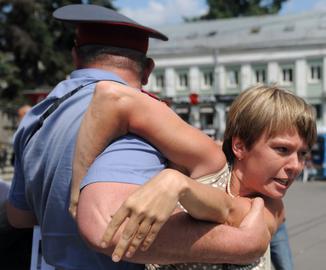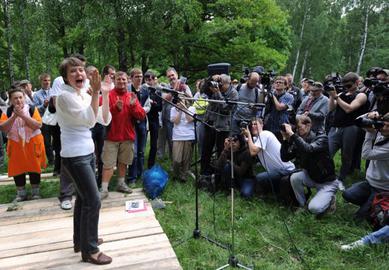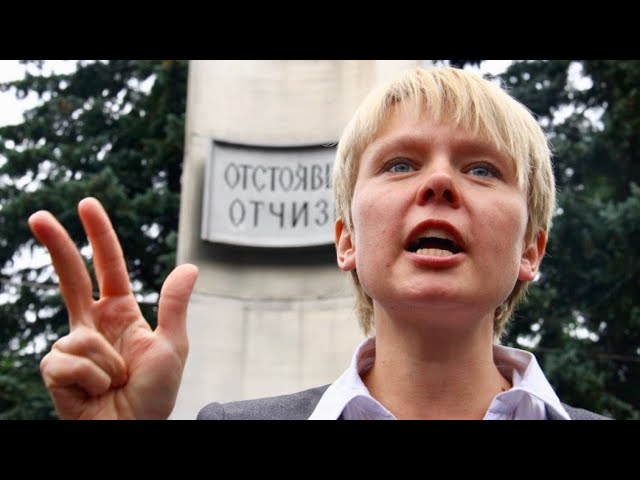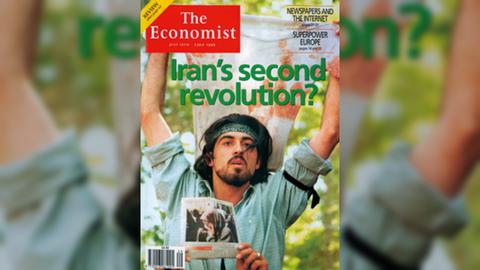Grassroots campaigner Evgeniya Chirikova was detained by Russian police on several occasions for her activism before fleeing the country in 2014. The staunch environmentalist tells IranWire that conversations with her fellow jailed compatriots helped her stay positive. Evgeniya Chirikova was interviewed by Marjan Greenblatt.
For almost 15 years Evgeniya Chirikova has been a force of nature in Russian grassroots activism, facing several spells of incarceration for her outspoken criticism of President Vladimir Putin’s government.
In 2006 Chirikova founded Save Khimki Forest, a peaceful campaign to conserve a 2,500-acre oak forest north of Moscow. The ancient forest was threatened by the Russian government’s plans to construct a highway through it, running from Moscow to St Petersburg.
Chirikova was arrested and detained on multiple occasions for mobilizing peaceful demonstrations and pickets against the plans, with citizens also moving into and occupying the forest itself.
As a result of her activism Chirikova was held in filthy conditions in Russian police cells for days at a time, often without food and water, or access to a telephone.
Now living in Estonia, Chirikova tells IranWire that “warm words” and good conversations with others helped make these experiences bearable, and advises people who are currently in quarantine due to the coronavirus to reach out to one another.
“I really believe in kind words,” she says. “We can share our energy, our life, our laugh and our good emotions with people who are with us in one household.”
Being repeatedly detained, Chirikova says, brought on a form of “mental sickness.” On being released she would often struggle to sleep normally, or would wash her hands and body obsessively.
In Russia Chirikova was tormented by flashbacks to her maltreatment at the hands of Russian police, by paranoia in the streets, and by the authorities’ attempts to take away her children.
Talking to fellow “inmates” in Russian police cells, she says, stopped her from being kept awake by concerns for her family while behind bars.
“I was imprisoned with a very interesting woman,” she recalls of one detention. “She worked in a museum. The conversation was about history, about culture, about different, interesting things: not only the political situation and our strategy. I spoke with her all night and I remember our conversation.”
Chirikova would also sing in captivity, which she says lessened the pain and reminded her of stories of Russian women who traditionally gathered together to sing about their strife.
In 2012 Chirikova was a winner of the Goldman Environmental Prize for her work furthering the cause of Khimkhi Forest. The family left Russia in 2014 in the face of incessant pressure from Putin’s government.
Working with Russian activists from afar can be stressful, Chirikova says, and going for 20-minute daily jogs in her local area helps her to clear her head. For the time being at least, most people in quarantine are still permitted to go out for exercise.
“I don’t know how it works but it’s really helpful,” Chirikova says. “If the authorities decide we need to stay at home and never go to the street, it will truly be a tragedy. But at this moment, it’s possible.”
For Chirikova, kindness is also key in a period of unprecedented isolation. “I remember my situation in prison,” she says. “It was so pleasant when people came and demanded our release. When we were released, people said such warm words to me. It gave me energy.
“We need to hug each other because if you live together, it’s possible. I tell my children I love them every day and it’s my biggest pleasure.”
visit the accountability section
In this section of Iran Wire, you can contact the officials and launch your campaign for various problems




























comments